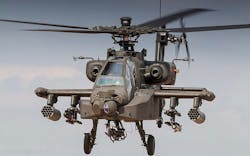Lockheed Martin to build electronic warfare (EW) system for AH-64E attack helicopter to counter enemy radar
REDSTONE ARSENAL, Ala. – U.S. Army combat helicopter designers needed electronic warfare (EW) systems to enable the AH-64E Apache Guardian attack helicopter to detect and identify enemy radar threats. They found their solution from Lockheed Martin Corp.
Officials of the Army Contracting Command at Redstone Arsenal, Ala., announced a $19 million contract Friday to the Lockheed Martin Rotary and Mission Systems segment in Owego, N.Y., to build the Modernized-Radar Frequency Interferometer (MRFI).
The MRFI identifies intelligence, surveillance, and reconnaissance (ISR) emitters, and helps the AH-64E pilot to detect and engage an enemy radar threat long before the aircraft becomes vulnerable.
The system quickly detects, identifies, and locates enemy radar, and then ranks these hostile radars in order of priority for subsequent ground attack.
The MRFI is part of the AH-64E's digital receiver-based AN/APR-48B system, which performs target acquisition and cueing for the helicopter's fire-control radar system.
It also can deliver warning of radar directed antiaircraft threats and serve as the controller for an integrated aircraft survivability equipment. The system provides high sensitivity and precision angle of attack in a lightweight, modular configuration
The AN/APR-48B system primarily operates on a dual-redundant MIL-STD-1553B databus. Other commercial I/O interfaces available for future growth include Gigabit Ethernet, RS-232, and RS-422.
On this contract Lockheed Martin will do the work in Owego, N.Y., and should be finished by February 2023. For more information contact Lockheed Martin Rotary and Mission Systems online at www.lockheedmartin.com, or the Army Contracting Command-Redstone at https://acc.army.mil/contractingcenters/acc-rsa.

John Keller | Editor-in-Chief
John Keller is the Editor-in-Chief, Military & Aerospace Electronics Magazine--provides extensive coverage and analysis of enabling electronics and optoelectronic technologies in military, space and commercial aviation applications. John has been a member of the Military & Aerospace Electronics staff since 1989 and chief editor since 1995.

